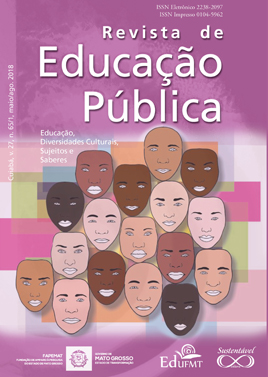A autoeficácia no desenvolvimento de carreira e sua influência na diversidade de gênero na computação
DOI:
https://doi.org/10.29286/rep.v27i65/1.6586Palavras-chave:
Autoeficácia. Desenvolvimento de Carreira. Diversidade de Gênero. Computação e Tecnologias.Resumo
Entender como a autoeficácia na computação é percebida pelas adolescentes ajuda a compreender as experiências que vivenciam em busca da diversidade de gênero na área. Objetiva-se discutir sobre como os gêneros influenciam na decisão profissional das adolescentes por seguirem carreiras e cursos de computação a partir da Psicologia do desenvolvimento da carreira e do papel da autoeficácia. Este artigo apresenta a construção da Escala de Autoeficácia em Tecnologias e Computação para estudantes de ensino médio e sua pilotagem com 14 alunas na qual observou-se uma baixa autoeficácia na tomada de decisão por cursos e nos conhecimentos de computação pelas alunas.Downloads
Referências
AMÂNCIO, Lígia. As assimetrias nas representações do género. Revista Crítica de Ciências Sociais, Coimbra, v. 34, p. 9-22, 1992.
BANDURA, Albert. Social-learning theory of identificatory processes. Handbook of socialization theory and research, Nova Iorque, v. 213, p. 262, 1969.
BANDURA, Albert. Social foundations of thought and action: a social cognitive theory. Englewood Cliffs, NJ: Prentice Hall, 1986.
BANDURA, Albert. Human agency in social cognitive theory. American psychologist, Filadélfia, v. 44, n. 9, p. 1175-1184, 1989.
BANDURA, Albert. Self-efficacy in changing societies. New York: Cambridge University Press, 1995. 334p.
BANDURA, Albert. Social cognitive theory of personality. In: PERVIN, L.; JOHN, O. P. (Ed.). Handbook of personality. New York: Guilford Publications, 1999. p. 154-196.
BANDURA, Albert. Guide for constructing self-efficacy scales. In: PAJARES, Frank; URDAN, Timothy C. (Ed.). Self-efficacy beliefs of adolescents, Greenwich, CT: IAP, 2006. p. 307-337. v. 5.
BEHJAT, Saeed; CHOWDHURY, Mohammmed S. Emotional intelligence, self-efficacy and diversity receptiveness of university students: a correlation study. International Journal of Academic Research in Business and Social Sciences, Raipur, v. 2, n. 4, p. 301, 2012.
BETZ, Nancy E.; HACKETT, Gail. The relationship of career-related selfefficacy expectations to perceived career options in college women and men. Journal of counseling psychology, College Park, v. 28, n. 5, p. 399-410, 1981.
BROWN, Duane. Introduction to Theories of Career Development and Choice: origins and Current Efforts. In: BROWN, D. and associates. Career Choice and Development. 4th ed. San Francisco, CA: The Jossey-Bass business, 2002.
CHOI, Jin Nam; PRICE, Richard H.; VINOKUR, Amiram D. Self‐efficacy changes in groups: effects of diversity, leadership, and group climate. Journal of Organizational Behavior, Nova Jersey, v. 24, n. 4, p. 357-372, 2003.
COMBS, Gwendolyn M.; LUTHANS, Fred. Diversity training: analysis of the impact of self‐efficacy. Human Resource Development Quarterly, Indianapolis, v. 18, n. 1, p. 91-120, 2007.
CRONBACH, Lee J. Coefficient alpha and the internal structure of tests. Psychometrika, Nova Iorque, v. 16, n. 3, p. 297-334, 1951.
DEAUX, Kay. From individual differences to social categories: Analysis of a decade’s research on gender. American Psychologist, Filadélfia, v. 39, n. 2, p. 105, 1984.
DUCHATELET, Dorothy el al. Exploring students’ differences of motivation, interest and self-efficacy in a cross-continental simulation context. In: 2nd TEACHING AND LEARNING CONFERENCE, June 9-10, 2016, Brussels, Belgium, p. 1-17, 2016.
FITZGERALD, Louise F.; FASSINGER, Ruth E.; BETZ, Nancy E. Theoretical advances in the study of women’s career development. In: WALSH, W.; OSIPOW, S. H. Career counseling for women. Nova Jersey: Lawrence Erlbaum Associates, Inc., 1995. p. 67-109.
HARDING, Sandra G. The science question in feminism. Nova Iorque: Cornell University Press, 1986. 271p.
HARTSOCK, Nancy. Foucault on power: a theory for women? In: NICHOLSON, L. J. (Ed.). Feminism/Postmodernism. London: Routledge, 1990. p. 157–175.
INSTITUTO NACIONAL DE ESTUDOS E PESQUISAS EDUCACIONAIS
ANÍSIO TEIXEIRA (INEP). Resumo Técnico da Educação Superior 2013. Diretoria de Estatísticas Educacionais - DEED, Instituto Nacional de Estudos e Pesquisas Educacionais Anísio Teixeira, Brasília, DF, 2015. 82p.
KARWOWSKI, Maciej; KAUFMAN, James C. (Ed.). The Creative Self: effect of Beliefs, Self-Efficacy, Mindset, and Identity. Cambridge: Academic Press, 2017.
LENT, Robert W.; BROWN, Steven D.; HACKETT, Gail. Toward a unifying social cognitive theory of career and academic interest, choice, and performance. Journal of vocational behavior, Amsterdã, v. 45, n. 1, p. 79-122, 1994.
LENT, Robert W.; BROWN, Steven D.; HACKETT, Gail. Social Cognitive career theory In: BROWN. In: BROWN, D. and associates. Career Choice and Development. 4th ed. San Francisco, CA: The Jossey-Bass business, 2002. p. 255-311.
PLANT, Sadie. Zeros and ones. Nova Iorque: Doubleday Books, 1997.
PORTAL BRASIL. Mulheres são maioria no ingresso e na conclusão de cursos superiores. Educação, 8, mar. 2015. Disponível em: <http://www.brasil.gov.br/educacao/2015/03/mulheres-sao-maioria-no-ingresso-e-na-conclusao-de-cursossuperiores>.
Acesso em: 1 jun. 2017.
PRISCO, Ana Paula Kalil; MARTINS, Cíntia Ribeiro; NUNES, Maiana Farias Oliveira. Estudos sobre autoeficácia aplicada ao desenvolvimento de carreira no Brasil: uma revisão. Revista Brasileira de Orientação Profissional, Florianópolis, v. 14, n. 1, p. 111-118, 2013.
ROJEWSKI, Jay W.; YANG, Baiyin. Longitudinal analysis of select influences on adolescents’ occupational aspirations. Journal of Vocational Behavior, Amsterdã, v. 51, n. 3, p. 375-410, 1997.
SAAVEDRA, Luísa. Assimetrias de Género nas Escolhas Vocacionais. Guião de educação - Género e cidadania. Lisboa: CIG, 2009.
SAAVEDRA, Luísa; TAVEIRA, Maria do Céu; SILVA, Ana Daniela. A
subrepresentatividade das mulheres em áreas tipicamente masculinas: factores explicativos e pistas para a intervenção. Revista Brasileira de Orientação Profissional, Florianópolis, v. 11, n. 1, p. 49-59, 2010.
TAVEIRA, Maria do Céu. Exploração e desenvolvimento vocacional de jovens. Minho, Portugal: Centro de Estudos em Educação e Psicologia, Universidade do Minho, 2000.
TAVEIRA, Maria do Céu; NOGUEIRA, Conceição. Estudos de género e Psicologia vocacional: confronto de teorias e implicações para a intervenção vocacional. In: COELHO, Helena; OLIVEIRA, Helena; LEONARDO, Joana. Desenvolvimento vocacional ao longo da vida: fundamentos, princípios e orientações. Coimbra: Almedina, 2004. p. 57-81.
TIMS, Maria; B. BAKKER, Arnold; DERKS, Daantje. Daily job crafting and the self-efficacy–performance relationship. Journal of Managerial Psychology, Bingley, v. 29, n. 5, p. 490-507, 2014.






















































